
Oct 16, 2024
In the fast-paced world of behavioral health, finding the best EHR for behavioral health practices has become crucial for efficient client management and treatment planning. Mental health professionals are increasingly turning to electronic health record systems to streamline their workflows, enhance patient care, and ensure HIPAA compliance. These sophisticated mental health EHR systems offer a range of features, from progress notes and patient portals to comprehensive treatment planning tools, revolutionizing the way therapists manage their practices.
As the demand for behavioral health EMR software continues to grow, practitioners face the challenge of selecting the right solution for their unique needs. This article explores the top 10 best EHR for mental health in private practice, examining their key features, usability, and overall effectiveness. From therapy EHR solutions tailored for solo practitioners to robust mental health practice management software designed for larger clinics, we'll dive into the options available to help mental health professionals make informed decisions about the tools they use to support their vital work.
SimplePractice
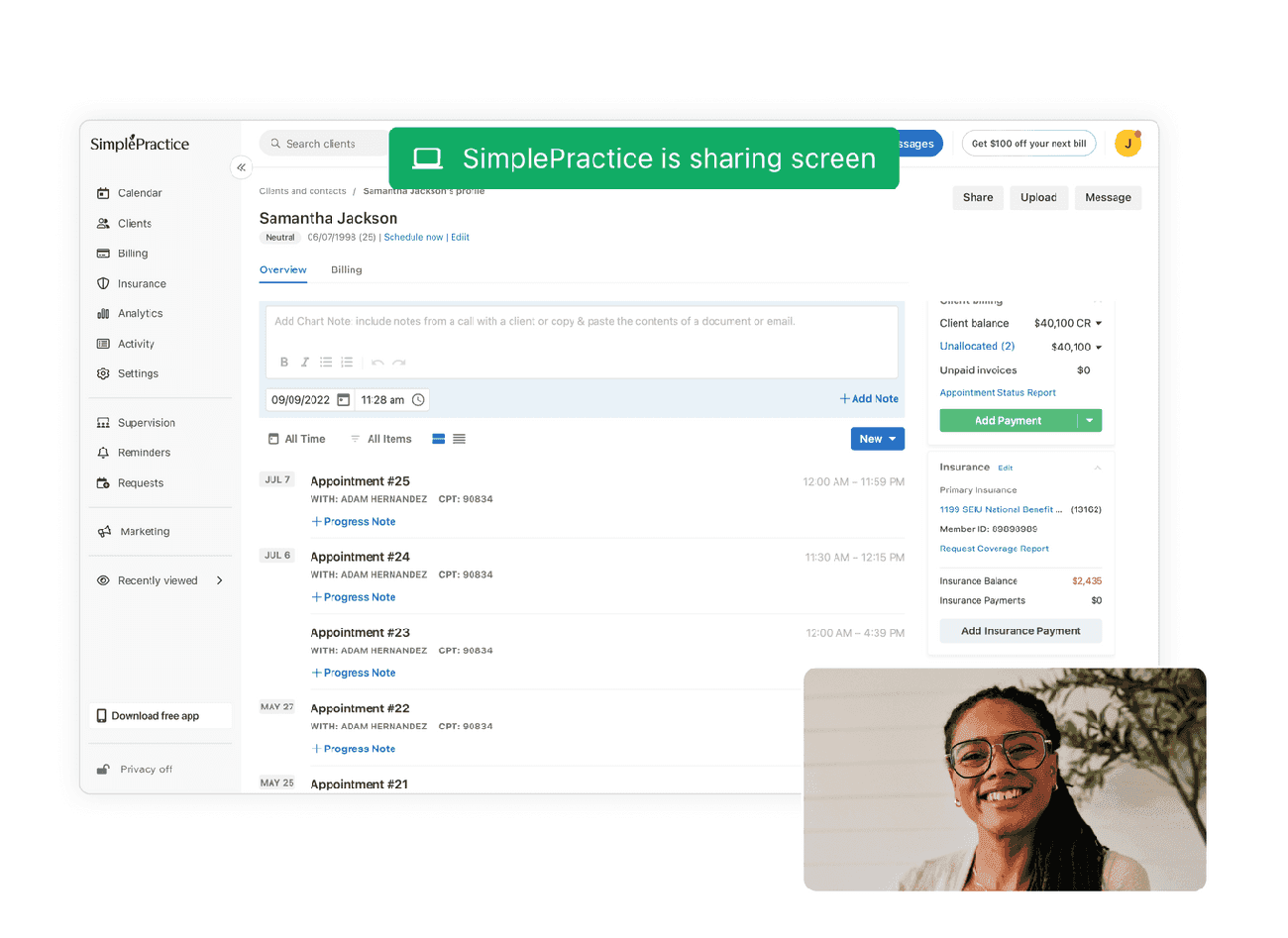
Image Source: SimplePractice
SimplePractice offers a comprehensive suite of features for behavioral health professionals to efficiently manage their practice:
Customizable progress notes and treatment plans, allowing practitioners to tailor documentation to their needs.
Secure client portal for easy communication and document sharing, including online appointment scheduling and form submission.
Integrated scheduling with appointment reminders, helping reduce no-shows and keep practitioners organized.
Paperless intake forms and consent documents, simplifying the onboarding process for new clients.
Robust billing tools that handle invoicing, credit card payments, and electronic insurance claims filing.
Additionally, SimplePractice integrates with the Wiley Treatment Planners®, providing access to over 1,000 prewritten treatment goals, objectives, and interventions, which saves significant time when creating individualized treatment plans for clients.
Pricing
SimplePractice offers three pricing plans:
Starter Plan: $29 per month, ideal for solo practitioners, including features like automated invoicing, online payments, and a client portal.
Essential Plan: $69 per month, which adds features such as customizable notes, administrative tools, and online appointment requests.
Plus Plan: $99 per month, which includes appointment reminders, client messaging, and other advanced features for streamlined practice management.
There is no free version, but SimplePractice offers a 30-day free trial to help new users get accustomed to the platform before committing to a paid plan. Group practices can also add additional clinicians at an extra cost.
Pros and Cons
Pros:
User-Friendly Interface: Many users find SimplePractice easy to use once set up, with a clean layout and intuitive navigation.
Comprehensive Feature Set: SimplePractice integrates scheduling, billing, documentation, and insurance billing, providing an all-in-one solution.
Mobile Access: The mobile app allows practitioners to manage client schedules, billing, and documentation on the go.
Customer Support: Users appreciate responsive customer support, which often updates features based on user feedback.
Cons:
Limited Customization: Some users mention the inability to customize certain forms and notes as a drawback.
Reporting Capabilities: The reporting features are seen as basic, which may not meet the needs of larger practices.
Initial Setup Challenges: A number of users found the initial setup challenging, particularly for integrating their data and configuring settings.
Pricing: The pricing structure can be challenging for part-time clinicians or those with fluctuating caseloads, as it may not be cost-effective for small practices.
Despite these limitations, SimplePractice remains a popular choice for solo and group practices looking for an affordable and user-friendly platform. Its focus on efficiency, security, and comprehensive features makes it a compelling choice for many behavioral health professionals.
TherapyNotes
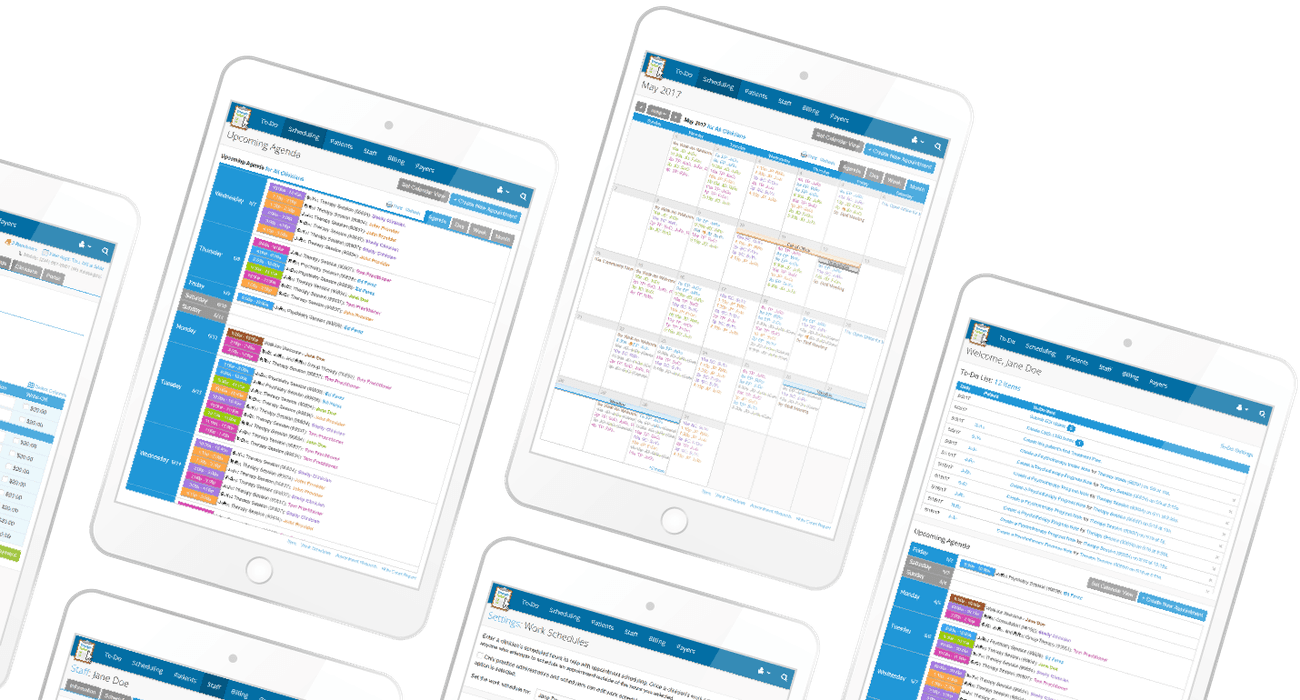
Image Source: www.therapynotes.com
TherapyNotes is a versatile platform that focuses on simplifying practice management for behavioral health professionals. Key features include:
Integrated Documentation Tools: TherapyNotes offers specific tools to assist therapists in documenting patient progress, managing appointments, and maintaining clinical records. Users can add progress notes, chart patient history, and manage intake assessments with customizable templates.
Comprehensive Billing and Claims Management: The software includes billing capabilities, electronic insurance claim submissions, and credit card processing. Users can handle billing tasks through features like CMS-1500 forms, claims scrubbing, and remittance advice to ensure claims are accurate and timely.
Patient Management: TherapyNotes helps manage all patient information in one place. The platform is known for HIPAA compliance, ensuring the privacy and security of sensitive patient data.
Telehealth Services: The platform includes integrated telemedicine features, allowing providers to offer remote care through video conferencing and a virtual waiting room.
Appointment Scheduling and Reminders: Users can easily book, reschedule, and manage recurring appointments. The integrated calendar syncs with other popular calendars, like Google Calendar, and appointment reminders can be set up via email or SMS.
Customer Support: TherapyNotes users frequently praise the responsive customer support team, which offers live assistance—a key differentiator from some competitors like SimplePractice.
Pricing
TherapyNotes offers three pricing tiers:
Solo Plan: Priced at $49 per month per user, this plan includes appointment reminders, credit card processing, and electronic billing.
Group Plan: Costs $59 per month per user, ideal for practices with multiple clinicians, offering similar features as the solo plan with group-specific management tools.
Enterprise Plan: For larger practices (30+ users), also priced at $59 per month per user, this plan includes more advanced administrative and billing tools.
TherapyNotes also offers a free trial, and unlike some competitors, it has a free version available.
Pros and Cons
Pros:
Excellent Customer Support: Many users appreciate the responsive customer support team, which helps navigate technical issues and provides prompt responses to user inquiries. TherapyNotes is well-regarded for taking user feedback seriously and making improvements based on suggestions
User-Friendly Interface: Users find TherapyNotes easy to navigate, with an intuitive design suitable for both experienced and less tech-savvy users. It is straightforward to set up and train new staff on.
Comprehensive Features: From billing and scheduling to patient management and telehealth, TherapyNotes offers an extensive range of tools for managing all aspects of a behavioral health practice.
Cons:
Billing System Challenges: Despite its comprehensive billing tools, some users find the billing system challenging to use, particularly for handling multiple insurances or customizing claim-related notes. The billing component can be less intuitive and frustrating at times, especially when dealing with claim rejections
Customization Limitations: Some users mention a lack of flexibility in customizing reports and clinical notes, which can be a drawback for practices needing more personalized documentation formats
Initial Setup: Users report that the initial setup process can be cumbersome, particularly for managing credit card services and obtaining necessary approvals for virtual practices.
No Mobile App: TherapyNotes does not have a dedicated mobile app, which may be inconvenient for therapists who need mobile-specific features for on-the-go management.
Overall, TherapyNotes is well-regarded for its ease of use, reliable customer support, and robust feature set that caters specifically to mental health professionals. It is a particularly strong choice for practices prioritizing customer support and HIPAA compliance, making it a reliable and efficient tool for managing day-to-day operations in the mental health field.
Valant
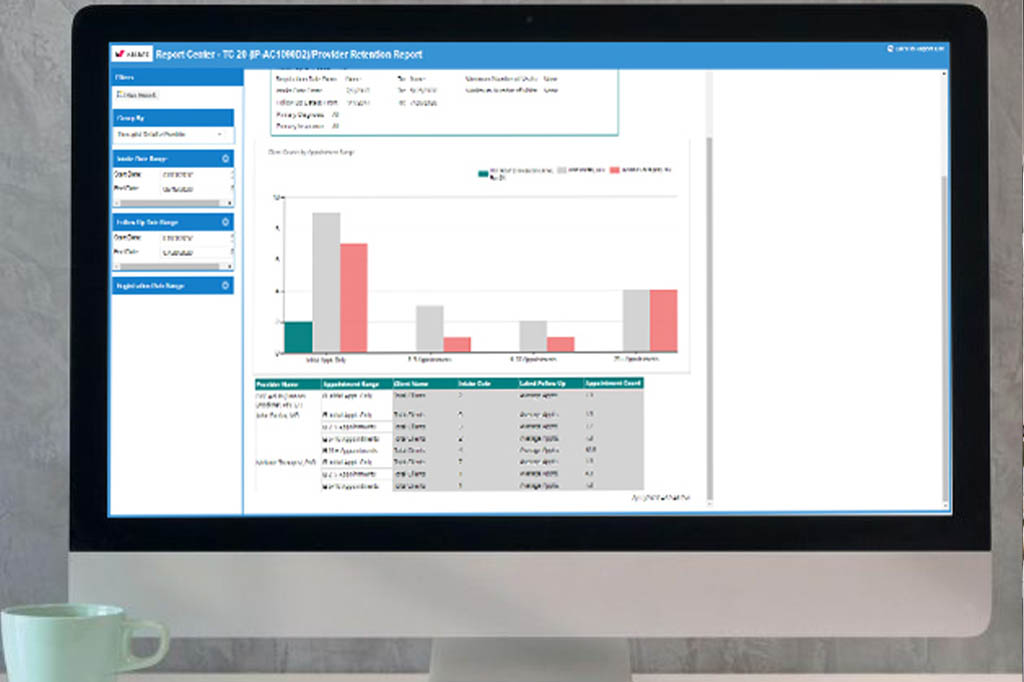
Image Source: Valant
Valant EHR is a comprehensive electronic health records system tailored for behavioral health professionals. It is well-suited for medium to large group practices, offering batch billing capabilities that simplify billing for multiple providers and streamline complex administrative processes. The platform provides customizable templates for treatment plans and detailed reporting features, allowing practitioners to tailor documentation to their needs and gain valuable insights into billing and financial metrics. Valant also includes integrated transcription and dictation services, reducing administrative workloads by enabling clinicians to dictate notes. While it lacks a dedicated mobile app, Valant can be accessed via mobile browsers, making it accessible for remote use. The system encourages detailed documentation that supports higher billing codes, helping practices optimize their reimbursement opportunities.
Pricing
Valant EHR Suite's pricing starts at $120 per month per user, which is higher compared to some of its competitors. However, many users believe the comprehensive features justify the cost, especially for larger practices that require extensive billing, scheduling, and administrative capabilities.
Pros and Cons
Pros:
Batch Billing and Financial Management: Valant's batch billing is particularly beneficial for practices managing multiple providers, making the billing process efficient and reducing administrative overhead.
Customizable Templates and Reporting: The ability to customize clinical documentation templates and access detailed reports helps practices tailor the software to their specific needs and improve their financial insights.
Transcription Flexibility: The integrated transcription service allows clinicians to either dictate or type notes, saving time and providing flexibility.
Multi-Provider and Multi-Location Support: Valant's features are designed for more complex practices, supporting multiple providers, multiple locations, and role-based permissions for enhanced security.
Encourages Detailed Documentation: Valant encourages documentation that supports higher billing codes, directly impacting a practice's revenue potential by optimizing the documentation process.
Cons:
Complex User Interface: Valant's comprehensive features come with complexity, which may make it less user-friendly compared to more straightforward systems like SimplePractice. Some users find the numerous tabs and fields overwhelming.
Customer Service Delays: While Valant offers knowledgeable support, users have reported long wait times for responses, particularly for email-based support requests, which can be frustrating for time-sensitive issues.
No Dedicated Mobile App: Valant lacks a dedicated mobile app, which may be a drawback for those who prefer the convenience of an app for on-the-go practice management. Access is limited to mobile browsers, which may not be as seamless as app-based solutions.
Expensive: Valant's pricing is higher than many of its competitors, which may be prohibitive for smaller practices or those with limited budgets.
User Sentiment
Valant EHR is well-regarded among medium to large group practices for its batch billing, customizable documentation, and financial management features. Despite the higher cost and complexity, users choose Valant for its comprehensive capabilities that simplify billing and administrative tasks, making it a strategic investment for larger practices that need advanced features to operate effectively. However, smaller practices or solo practitioners might find alternatives like SimplePractice more accessible and better suited to their needs due to its simplicity and lower cost.
CounSol.com
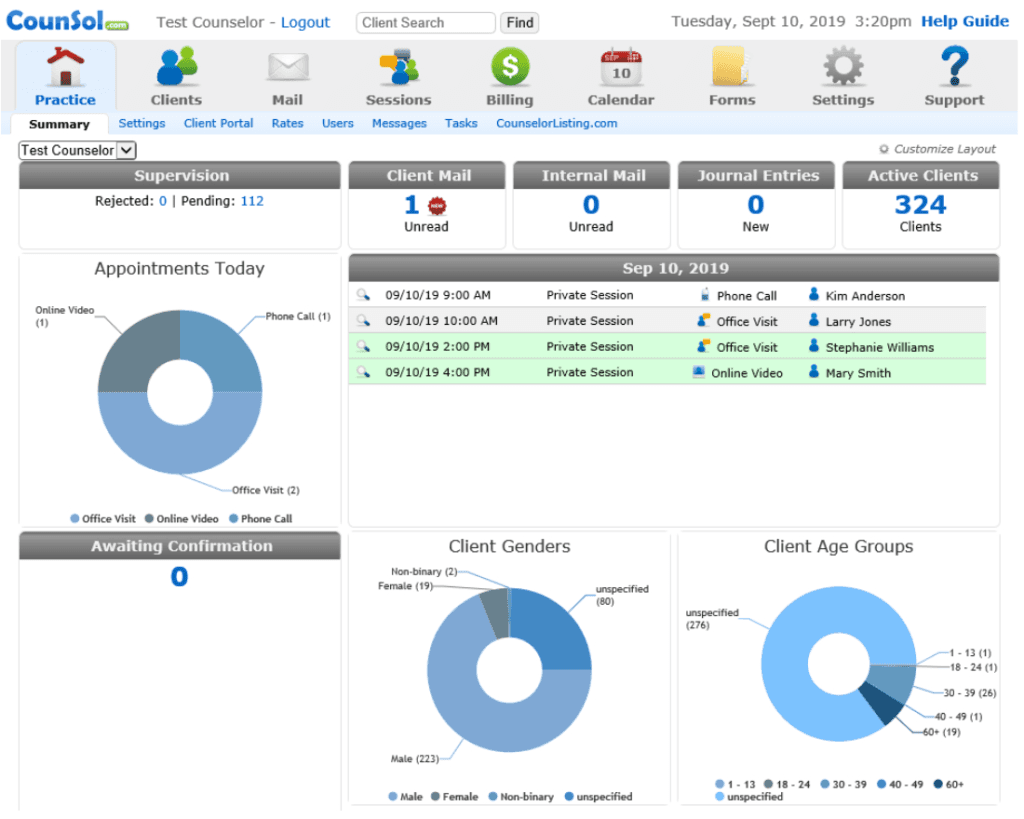
Image Source: CounSol.com
CounSol EHR is an electronic health records system designed for mental health professionals, especially those in small to medium-sized practices. It offers features like integrated billing, customizable forms, client scheduling, and progress tracking, making it easy for practitioners to manage all administrative tasks in one place. One of the standout features of CounSol is the client portal, which supports paperless onboarding and allows clients to complete intake forms online, even for elderly clients who find the portal easy to use. The system also integrates payment processing through Stripe, making it convenient to manage billing and payments.
CounSol also includes appointment reminders, electronic signature capabilities, and a proprietary telehealth system. However, some users have reported that the telehealth interface is less intuitive, and there are challenges related to the lack of Zoom integration, which forces users to use CounSol's own video solution that has mixed reviews for ease of use and reliability.
Pricing
CounSol offers a flat-rate pricing model, starting at $29 per month, which makes it one of the more affordable EHR options for solo practitioners and small practices. Users appreciate its value for money, especially given the wide range of features included, from billing to client management to telehealth capabilities.
Pros and Cons
Pros:
User-Friendly Onboarding: Clients can easily onboard through the portal by completing intake forms and disclosures. This is helpful for streamlining the onboarding process, even for less tech-savvy clients.
Customization: Users can customize their dashboard to only show what's important to them, improving usability and making the interface less cluttered. It also supports customized forms, although some users found creating their own forms to be challenging.
Excellent Customer Support: CounSol is frequently praised for its customer service, which is described as responsive, quick, and helpful. The support team is available by phone and email, often providing immediate assistance.
Affordable: CounSol’s pricing is seen as competitive compared to other EHR systems like SimplePractice or TherapyNotes, offering good value for solo or small practices that need comprehensive practice management features.
Cons:
Interface and Integration Limitations: The user interface is less polished compared to some competitors, though it is still easy to navigate. Additionally, the lack of two-way calendar integration and Zoom support can be cumbersome for users. CounSol's proprietary telehealth solution has been reported to cause issues for some clients during sessions.
Reporting Features: The reporting capabilities in CounSol are limited, and generating specialized reports can be difficult. This can be a drawback for practices that need detailed reporting beyond basic financial or appointment metrics.
Billing Complexity: Setting up insurance billing can be challenging for some users. While the billing system works well once it's set up, the initial setup is noted as being less straightforward.
User Sentiment
Overall, CounSol is well-regarded for its affordability, customer support, and ease of use, particularly for small practices. Its client onboarding and integrated billing make it a viable option for those looking for an EHR system that supports most of their needs without being overly expensive. However, the lack of integration with third-party platforms like Zoom and the limited reporting capabilities may make it less suitable for larger practices or those needing advanced features. The simplicity and customer service are highlighted as the strongest aspects of CounSol, especially in comparison to other options like SimplePractice or TherapyNotes, which may offer more integrations but lack the same level of responsive support.
ICANotes
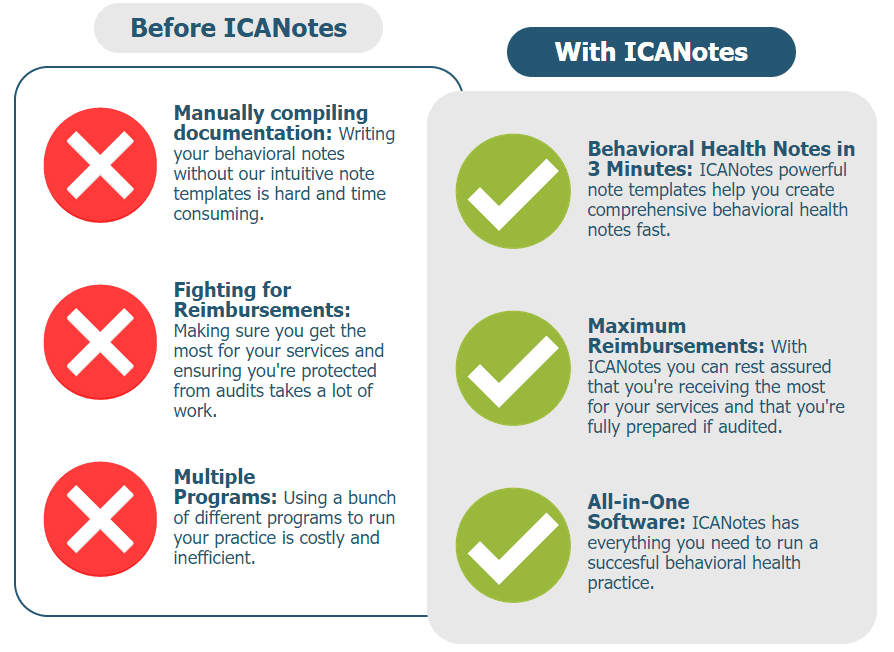
Image Source: ICANotes
ICANotes is a behavioral health-specific EHR designed to meet the unique needs of mental health practitioners. One of the standout features of ICANotes is its ease of use when creating detailed and professional notes, making documentation a quick and streamlined process. Users highlight the ability to add preset prompts and customizable buttons that can automatically insert relevant text, reducing the need for repetitive typing during patient visits. This functionality helps with maintaining high-quality, consistent notes that can be completed during sessions, which many users appreciate.
ICANotes also integrates with DrFirst for e-prescribing, offering an easier way to handle prescription renewals directly within the platform. Another positive aspect is the flexibility to create and repurpose templates for notes, treatment plans, and other documents, making it ideal for smaller to medium-sized mental health practices that want to tailor their clinical documentation.
However, there are some limitations regarding usability. The interface of ICANotes is often described as dated and visually less appealing compared to modern EHR systems. It has a steep learning curve initially, and some users report that navigating the different sections can be cumbersome, particularly when trying to refer to previous notes during a session. The system also lacks a built-in telehealth solution, though ICANotes is expected to add telehealth capabilities soon. Additionally, the platform’s integration with other systems, such as credit card processing, was reported to be problematic, not meeting users' expectations.
Pricing
ICANotes offers four pricing plans tailored to the unique needs of behavioral health practices. The Standard plan starts at USD 49.95 per month, the Standard Plus plan at USD 59.95 per month, the Premium plan at USD 64.95 per month, and the Premium Plus plan at USD 69.95 per month. Additional counselors can be added to each plan for a monthly fee ranging from USD 35.00 to USD 45.00, depending on the chosen plan
Pros and Cons
Pros:
Efficient Note Creation: The ability to use preset prompts and customize notes reduces the time needed for documentation. This efficiency is a major advantage for therapists who need to maintain thorough patient records without spending too much time outside of sessions.
E-Prescribing: Integration with DrFirst allows for streamlined prescription renewals and efficient medication management.
Customization: ICANotes allows for high customization of note templates and treatment plans, making it versatile for different types of mental health services.
Customer Support: Users generally report a positive experience with customer support, noting its responsiveness and availability, even for late-hour inquiries.
Cons:
Outdated Interface: The visual appearance and general interface of ICANotes are often described as outdated. Users note that the interface lacks the polished, intuitive design seen in more modern EHRs, which can make navigating the system less user-friendly.
Integration Limitations: Issues with integration have been reported, such as partial functionality of the e-prescribing module and problems with third-party credit card processing.
Lack of Telehealth Features: Currently, ICANotes does not have built-in telehealth capabilities, which is a significant drawback for practices wanting an all-in-one solution for virtual care.
Complex Navigation: The system requires multiple steps to update different areas of a medical chart, and some processes, such as managing treatment plans, can be cumbersome. Users have expressed frustration at the number of clicks required to accomplish certain tasks.
User Sentiment
ICANotes is well-regarded by mental health professionals who need an EHR tailored specifically to their field. It is particularly appreciated for its efficient note-taking capabilities and customizable templates, which help maintain high-quality clinical documentation. Despite its positives, ICANotes has some limitations that could deter larger practices, especially in terms of usability, integration issues, and the absence of telehealth features. The system seems most suitable for individual practitioners or small to medium-sized practices that prioritize documentation efficiency and need an affordable, customizable solution.
Let me know if you need more information or further comparison with other EHR systems!
TherapyAppointment
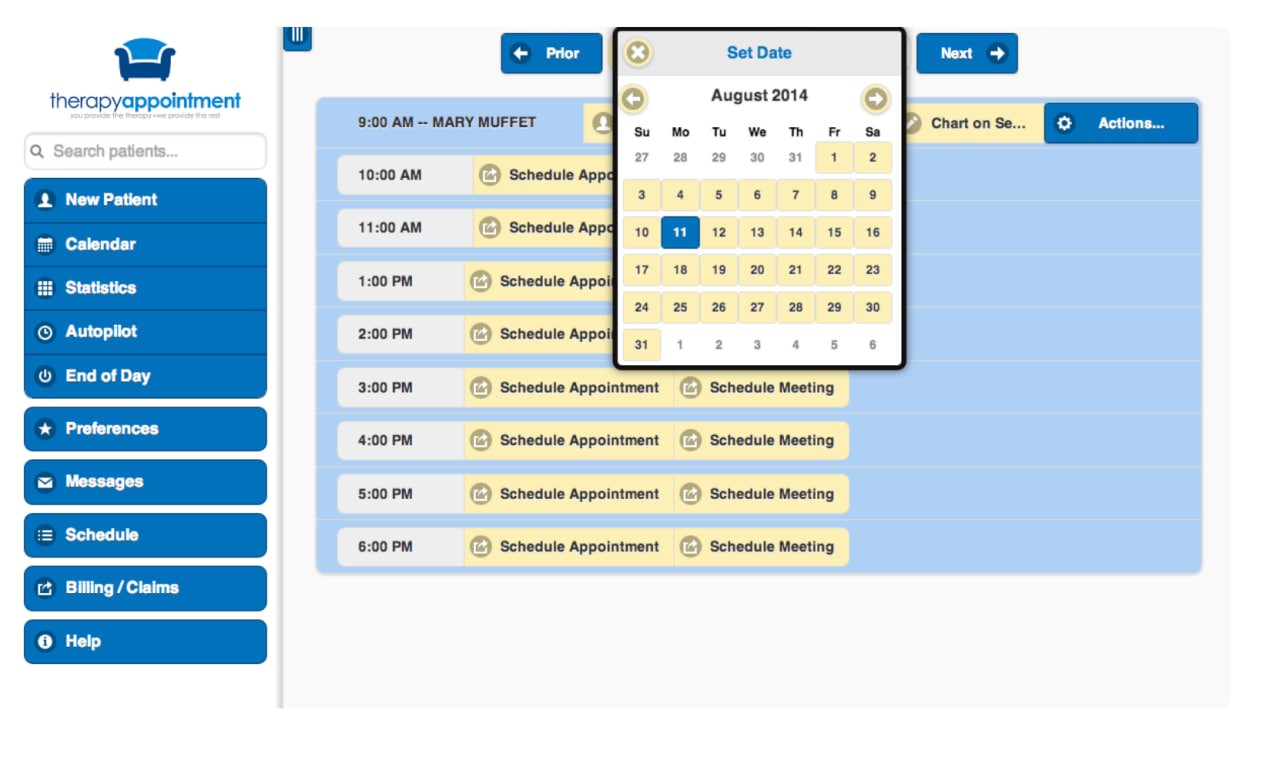
Image Source: TherapyAppointment
TherapyAppointment is designed to support small to medium-sized mental health practices, offering a range of features such as customizable progress notes, electronic signatures, appointment scheduling, and secure client communication through a portal. It includes integrated telehealth, which is reliable for conducting remote therapy sessions, and is HIPAA-compliant, ensuring that all client data is secure.
The software provides a robust, customizable EHR system for clinical documentation, helping therapists create and manage treatment plans and progress notes effectively. Additionally, TherapyAppointment is equipped with a self-service client portal that enhances client engagement by allowing for online scheduling and paperwork submission. However, it lacks some of the deeper customizability found in other platforms like SimplePractice, particularly in documentation templates and billing options
Pricing
TherapyAppointment is known for its affordable pricing structure, which makes it particularly appealing for new and solo practitioners. It starts at just $10 per month for 10 or fewer scheduled appointments, scaling up to $59 per month for unlimited scheduling. This flexible pricing is more affordable compared to competitors like SimplePractice and TherapyNotes, which can be significantly more expensive, especially for small practices
Pros and Cons
Pros:
Affordability: TherapyAppointment's pricing is more accessible for smaller practices, with a tiered model that grows with your practice size.
Integrated Telehealth: Users appreciate the integrated, reliable telehealth features, which make remote therapy seamless.
User-Friendly Interface: The interface is straightforward and easy to use, with good customization options for forms and intake processes.
Strong Customer Service: Reviews frequently praise TherapyAppointment's responsive customer support, which helps address issues efficiently.
Cons:
Lack of Mobile App: TherapyAppointment does not offer a mobile app, which is a drawback for therapists who prefer to manage their practice on the go. However, the platform can still be accessed via web browsers on mobile devices.
Limited Integration: TherapyAppointment lacks the extensive integration capabilities of other platforms like SimplePractice, meaning it does not support connections to third-party apps such as Google Calendar or Zoom as seamlessly.
Billing and Invoicing Limitations: Users have reported difficulties with billing setup, including a lack of support for submitting secondary insurance claims and challenges with getting invoices customized with their letterhead.
User Sentiment
TherapyAppointment is generally well-regarded for its affordability, ease of use, and reliable features, especially for new or solo practices. It is often compared to SimplePractice, which offers more customization options but at a higher price point. For those seeking a straightforward, cost-effective solution with essential features like telehealth and client management, TherapyAppointment is a solid option. However, for practices needing deeper integration or a more modern user experience, other platforms might be a better fit
Kareo
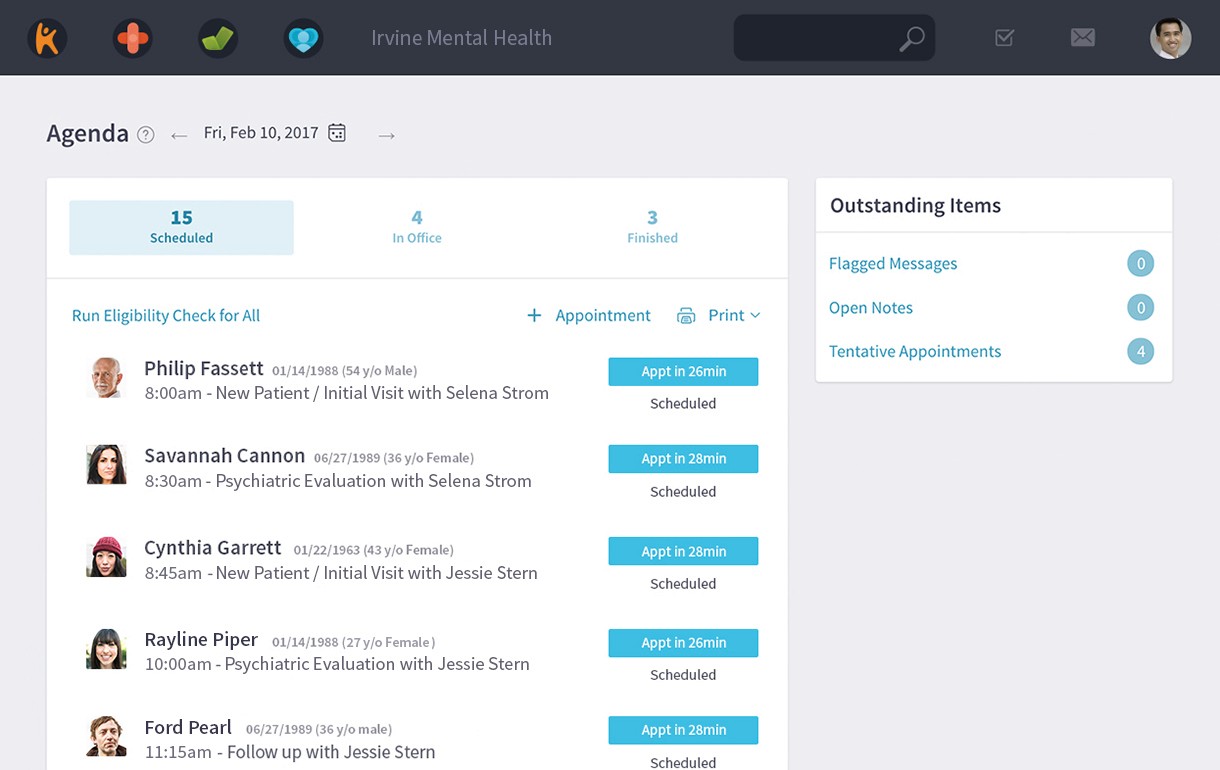
Image Source: Kareo
Kareo EHR, now branded under Tebra, is a cloud-based platform designed for small to medium-sized healthcare practices. It provides an all-in-one solution for patient care, billing, and practice management, making it especially useful for practices that need to streamline their administrative and financial operations. Kareo includes features such as customizable clinical note templates, e-prescribing, and integrated billing management, allowing healthcare professionals to handle both clinical and financial tasks effectively. The platform is user-friendly and includes a number of shortcuts and templates that simplify the documentation process, which many users appreciate for its efficiency.
Pricing
Kareo offers four pricing plans tailored to the unique needs of behavioral health practices. The Essentials plan starts at USD 150.00 per provider per month. Although this pricing is higher compared to some other EHR systems, many users find it reasonable given the breadth of features and services it offers, especially for practices with complex billing needs.
Pros and Cons
Pros:
Comprehensive Billing Management: Kareo excels in providing a complete revenue cycle management solution, which includes claims submission, denial tracking, and automated payment reminders. This is particularly beneficial for practices that need advanced financial tools to optimize revenue and manage insurance claims.
Ease of Use: The platform is known for its intuitive interface and user-friendly design. The availability of pre-made templates and shortcuts further simplifies workflow and reduces the learning curve for new users.
Training Resources: Kareo offers "Kareo University," an on-demand training platform that allows providers and staff to learn at their own pace, ensuring that onboarding is as smooth as possible. This is a significant benefit for practices looking to bring on new staff efficiently.
Integrated E-Prescribing: The platform includes integrated e-prescribing capabilities through DrFirst, making it easier for providers to manage prescriptions directly within the system.
Cons:
Customer Support Issues: Users frequently report challenges with customer support, including slow response times and difficulty in resolving technical problems. This can be particularly frustrating for practices that need timely assistance.
Billing and Claims Rejections: While Kareo is known for its billing capabilities, some users have experienced a high volume of rejected claims, which can be difficult to troubleshoot effectively. This has led to frustrations among billing staff, particularly in practices that rely heavily on accurate and timely reimbursements.
Telehealth Limitations: Kareo offers telehealth features, but users report that these can be unreliable, leading to issues during patient appointments. This affects the overall care experience and makes the telehealth option less attractive compared to other EHR solutions.
Reports and Documentation Issues: Some users have noted inaccuracies or missing information in generated reports, which affects their ability to track performance metrics reliably.
User Sentiment
Kareo is generally appreciated for its user-friendly design, comprehensive billing tools, and training resources. It is well-regarded by small to medium-sized practices that need a platform capable of handling both clinical and financial operations seamlessly. The integration of billing and e-prescribing makes it a solid choice for practices with significant billing needs. However, recurring issues with customer support, claim rejections, and telehealth reliability are notable drawbacks that can impact the day-to-day operations of a healthcare practice. Overall, Kareo is a strong option for those who need an easy-to-use solution for managing billing and clinical documentation, but its limitations should be considered when making a decision.
TheraNest
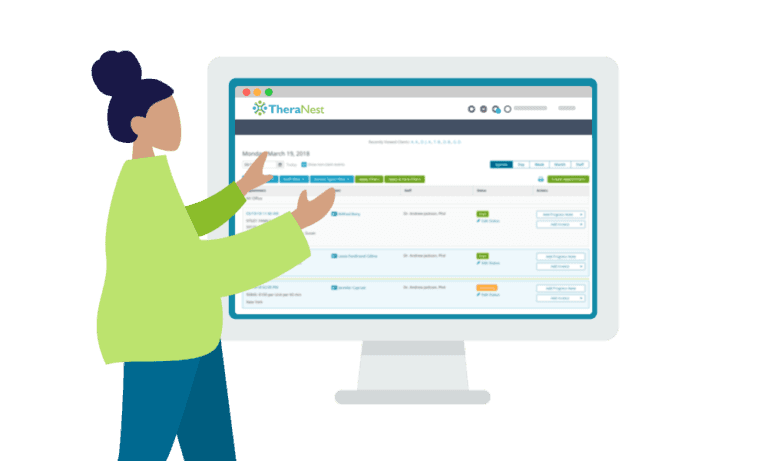
Image Source: theranest.com
TheraNest is a web-based mental health solution that caters to solo practitioners, large practices, and nonprofit organizations. It provides an array of features, including electronic medical records (EMR), customizable progress notes, treatment plans, discharge notes, and DSM/ICD coding support. Users also have access to a client portal, patient scheduling, batch invoices, and teletherapy, making it a comprehensive solution for mental health professionals. TheraNest's billing features are also notable, offering insurance claims management, credit card services, and detailed reporting options such as payroll, staff billing, and invoice reports. The platform also includes unlimited document storage and mobile access via an app for Android and iOS devices, allowing practitioners flexibility in managing patient care remotely. However, some users have found the billing functionality to be somewhat lacking compared to more specialized billing systems
Pricing
TheraNest's pricing model is tiered based on the number of active clients. Plans start at $39 per month for up to 30 active clients. The cost scales with the size of the client base: $50 per month for 40 clients, $60 per month for 50 clients, and $91 per month for 80 clients. For practices with over 100 active clients, pricing is custom and requires contacting the sales team. TheraNest also offers a free trial, allowing prospective users to explore its features before committing to a plan. Despite the higher pricing for larger practices, many users appreciate its scalability and affordability for small practices
Pros and Cons
Pros:
Affordable for Smaller Practices: TheraNest is scalable, with tiered pricing that makes it an affordable choice for small and growing practices. The flexible pricing allows providers to pay only for what they need, without excessive overhead costs.
User-Friendly Interface: The interface is simple and easy to use, with customizable templates for treatment plans and progress notes. It also includes the Wiley treatment planner, which many users find helpful for structuring therapy sessions.
Comprehensive Client Management: The client portal, intake forms, and appointment reminders are frequently praised for improving client engagement and administrative efficiency. Telehealth capabilities add value by allowing remote care.
Strong Customer Service: Users often commend TheraNest for its customer support, which is described as responsive and helpful. This level of support has helped users resolve issues quickly and effectively, making it easier to adopt the platform's many features
Cons:
Billing Limitations: Some users find TheraNest's billing features insufficient for managing complex billing processes, such as handling insurance claims and managed billing. Users have expressed frustration with errors in the billing module and customer support not being able to resolve issues satisfactorily.
Occasional Rate Increases: There are reports of unexpected rate increases after feature updates, which can be frustrating for users. Additionally, the platform's billing support and managed billing services have faced criticism for poor issue resolution and high fees without adequate service delivery.
Limited Customization for Larger Practices: While TheraNest works well for smaller practices, larger practices may find the customization options limited when dealing with complex workflows, which could hinder their efficiency in managing a growing client base.
User Sentiment
TheraNest is well-regarded for its affordability, ease of use, and extensive customer support, making it an attractive option for solo practitioners and small to medium-sized practices. It provides a comprehensive set of tools for managing therapy sessions, billing, and client communication, which helps streamline day-to-day operations. However, the limitations in billing functionality and issues with support regarding managed billing make it less ideal for practices needing a more advanced billing solution. Overall, TheraNest is an excellent choice for practices that need a cost-effective, reliable EHR solution with strong customer support and telehealth capabilities, but larger practices may require more robust customization and billing features.
SmartClinix
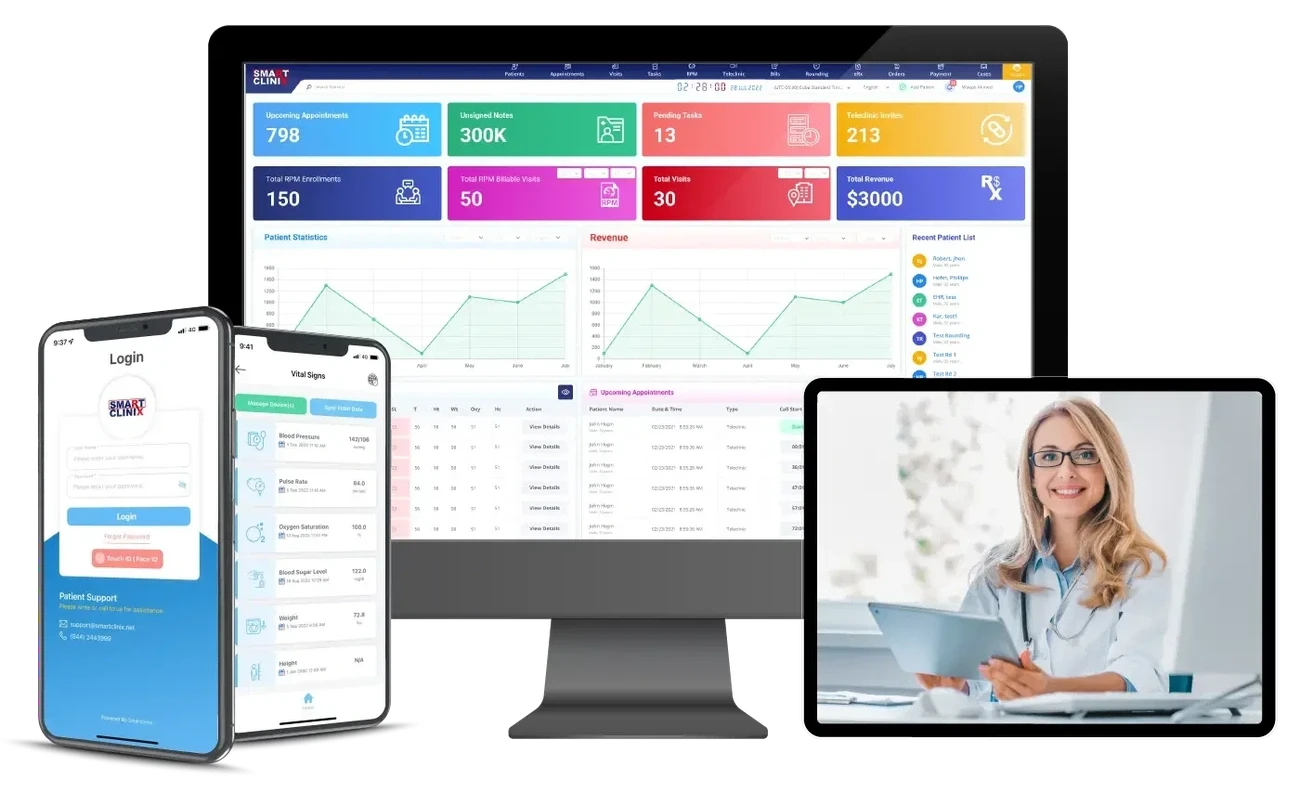
Image Source: smartclinix.net
SmartClinix is a cloud-based healthcare solution designed to cater to medical practices of all sizes, including small practices, physician groups, and hospitals. It offers a wide range of functionalities, such as electronic medical records (EMR), telemedicine, remote patient monitoring, healthcare digital marketing, and medical billing. Key features include appointment scheduling, charting, e-prescribing, automated reminders, payment processing, and HIPAA compliance, along with a self-service client portal and practice management tools. Additionally, SmartClinix provides specialized hardware like telehealth carts to facilitate better care delivery.
Pricing
SmartClinix pricing starts at $20 per user per month, making it one of the more affordable EHR solutions. The cost varies based on the features required, the level of customization, and support or training needed. There is no free trial or free version available, but the competitive starting price is attractive for practices looking for an affordable, robust solution.
Pros and Cons
Pros:
Affordable Pricing: Starting at $20 per user per month, SmartClinix provides an economical option for healthcare providers, making it accessible to small practices that need an affordable telemedicine and practice management system.
Comprehensive Feature Set: The platform offers integrated telehealth, remote patient monitoring, medical billing, and e-prescribing, providing an all-in-one solution for various healthcare needs.
Deployment Flexibility: Available as a cloud, SaaS, and web-based service, SmartClinix allows easy access across devices and locations, facilitating remote care and management.
Cons:
Lack of Reviews and Feedback: Currently, SmartClinix lacks user reviews, which can make it challenging to gauge overall user sentiment or identify common pain points experienced by customers.
Limited Training Options: While training is available through webinars, in-person sessions, and live online options, the overall extent of training resources is not as comprehensive as some other EHR platforms, which may hinder new users during onboarding.
User Sentiment
SmartClinix aims to provide a feature-rich yet affordable EHR and telemedicine solution for healthcare practices of all sizes. Its competitive pricing and comprehensive range of services make it a viable choice for practices looking to implement digital healthcare tools without a substantial financial commitment. However, the lack of substantial user reviews and potential training limitations may pose challenges for some practices.
SessionsHealth

Image Source: www.sessionshealth.com
SessionsHealth is a cloud-based EHR system specifically tailored for mental health professionals. It combines ease of use with comprehensive features, making it a suitable choice for solo practitioners as well as larger group practices. SessionsHealth includes tools for scheduling with online booking, integrated telehealth, electronic signatures for intake forms, and customizable templates for notes and documents. The platform also offers automated billing through AutoPay, electronic claims submissions, and insurance eligibility verification, helping therapists manage financial aspects of their practice effectively. The system supports a wide range of specialties, including counseling, psychiatry, and substance abuse treatment. One notable feature is the user-friendly interface and integrated feedback tools that make it easy to keep track of client progress. The platform is also known for its customer support, which has been highly rated for responsiveness and quality【134†source】【135†source】.
Pricing
SessionsHealth offers a professional plan starting at $39 per month for the initial practitioner, with an additional cost of $29 per month for each additional practitioner. The plan includes unlimited clients and free supervisor, biller, and scheduler roles. Additionally, SessionsHealth offers a freemium plan that allows practitioners to serve up to three clients at no cost, making it an attractive choice for those just starting out. There is also a 30-day free trial that doesn’t require a credit card, providing a risk-free way for new users to explore the platform. The cost structure, combined with the flexible plan options, makes SessionsHealth highly competitive for mental health professionals looking for an affordable EHR solution
Pros and Cons
Pros:
Affordability and Value for Money: SessionsHealth offers a low starting price compared to other EHR platforms, with a freemium plan for smaller client bases. This affordability makes it accessible for new and solo practitioners. Users also appreciate the fair pricing structure, especially when compared to higher-priced competitors like SimplePractice.
Excellent Customer Support: Users often praise SessionsHealth for its highly responsive customer service, which is noted for being helpful and detailed. The support team provides clear guidance during onboarding and is proactive in resolving any issues that arise.
User-Friendly Interface: The platform's intuitive design makes it easy to navigate, with customizable forms and pre-set assessment templates that streamline the documentation process. SessionsHealth also provides helpful tools for working with couples and families, which some users find easier than other EHR systems.
Integrated Telehealth and Automated Billing: SessionsHealth includes built-in telehealth, which makes it convenient for practitioners offering remote services. The platform also provides automated billing and claims submission features that help streamline the payment process and reduce administrative burdens.
Cons:
Limited Customization Options: Some users have noted a lack of customization options, particularly in arranging sections within forms, which can be restrictive when personalizing client records. This limitation may affect the experience of practitioners who prefer more flexibility in how they organize their documents.
No Mobile App: SessionsHealth does not currently offer a dedicated mobile app, which may be a drawback for therapists who need more on-the-go accessibility. However, the platform can be accessed through a mobile browser, which provides some level of mobility.
Lack of EAP Claims Support: The platform currently lacks support for billing Employee Assistance Program (EAP) claims, which can be a limitation for practices that frequently work with these types of cases.
Initial Learning Curve: Although the platform is generally easy to use, some practitioners reported a short learning curve when first setting up the system, particularly in managing couple and family records. This might pose a minor inconvenience during the initial onboarding process.
User Sentiment
SessionsHealth is well-regarded among mental health professionals for its user-friendly interface, comprehensive customer support, and affordable pricing. It is a solid option for solo and small group practices that need a simple yet powerful EHR platform without incurring high costs. The platform's integrated telehealth, easy-to-use documentation tools, and transparent pricing make it highly attractive, particularly for practitioners moving away from more expensive systems like SimplePractice. However, the limited customization, lack of EAP claims support, and absence of a dedicated mobile app are areas for potential improvement. Overall, SessionsHealth offers great value for the cost, particularly for those looking to streamline their practice management efficiently.
How Yung Sidekick compliments your EHR

Image Source: yung-sidekick.com
Yung Sidekick is designed to seamlessly integrate with your existing EHR system, enhancing your practice's efficiency and effectiveness. By capturing your therapy sessions and automatically generating progress notes, client reports, and valuable insights, Yung Sidekick saves you time and allows you to focus on what matters most – providing exceptional care to your clients.
With Yung Sidekick, you can easily record both online and in-person sessions or upload existing recordings. Our advanced AI technology intelligently extracts key topics, themes, symptoms, medications, goals, and more, creating comprehensive session summaries and progress notes that are ready to be integrated into your EHR.
In addition to streamlining your documentation process, Yung Sidekick provides valuable insights into patterns, resilience strategies, and therapeutic relationships. These analytics can help you enhance your clinical acumen and make more informed decisions about your clients' care.
For clients with multiple sessions, Yung Sidekick compiles in-depth psychological profiles and dynamic client stories, giving you quick access to summaries and helping you efficiently prepare for upcoming sessions. This feature is particularly useful for mental health professionals who manage a large caseload or need to quickly review a client's history before a session.
If you prefer not to record sessions, Yung Sidekick's 'Dictate Recap' feature allows you to verbally summarize the session, and our AI will transform your spoken words into detailed notes. This flexibility ensures that Yung Sidekick can adapt to your preferred workflow and documentation style.
By integrating Yung Sidekick with your EHR system, you can experience the benefits of AI-powered documentation and insights while maintaining your existing workflow. Our goal is to make the integration process as seamless as possible, so you can start saving time and enhancing your practice right away.
Conclusion
The world of behavioral health EHR systems has come a long way, offering mental health professionals a range of options to streamline their practices. From user-friendly interfaces to robust security measures, these platforms are changing the game in client management and treatment planning. The top 10 EHRs we've explored each bring something unique to the table, catering to different needs and preferences within the behavioral health community.
As you weigh your options, remember that the right EHR can make a big difference in your day-to-day operations and client care. To take your practice efficiency to new heights, consider giving Yung Sidekick a try – it seamlessly integrates with your chosen EHR to supercharge your workflow. Ultimately, the goal is to find a solution that not only meets your current needs but also grows with your practice, allowing you to focus on what matters most: providing top-notch care to your clients.
What to Read?
CounSol EHR: What You Need to Know
ICANotes EHR: What You Need to Know
TherapyAppointment EHR: What You Need to Know
Kareo EHR: What You Need to Know
SmartClinix EHR: What You Need to Know
SessionsHealth EHR: What You Need to Know
References
If you’re ready to spend less time on documentation and more on therapy, get started with a free trial today
Not medical advice. For informational use only.
Outline
More articles






